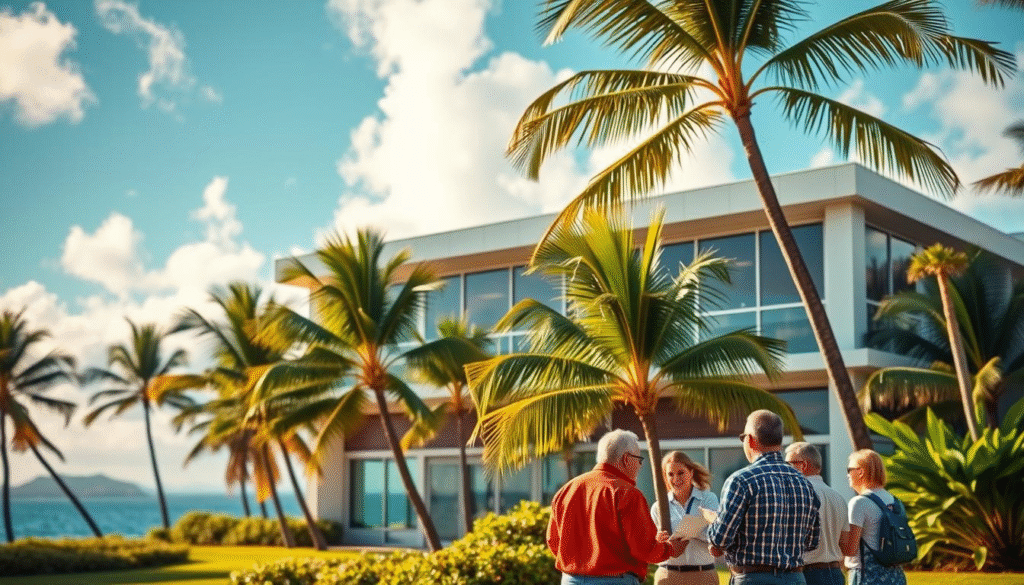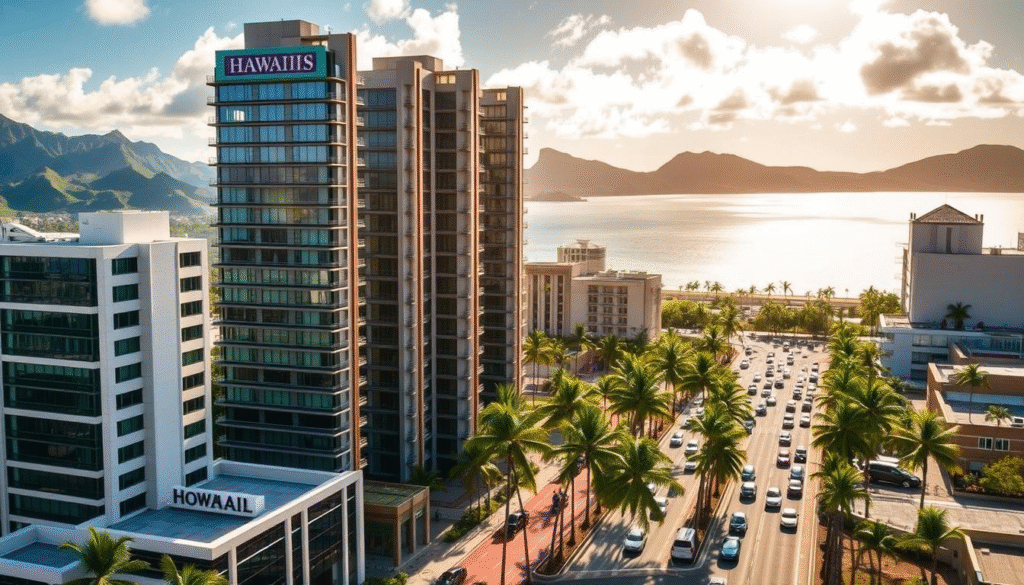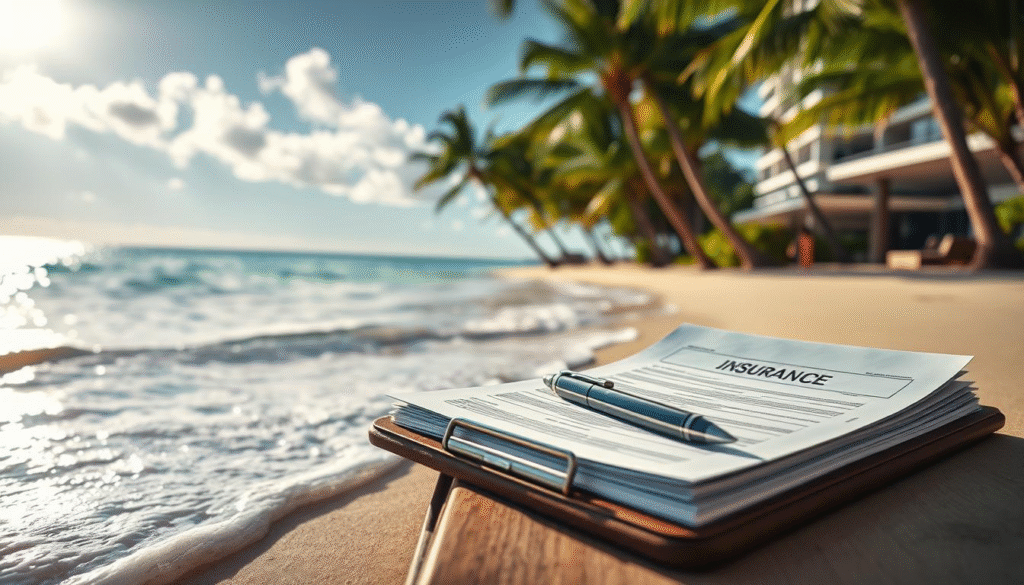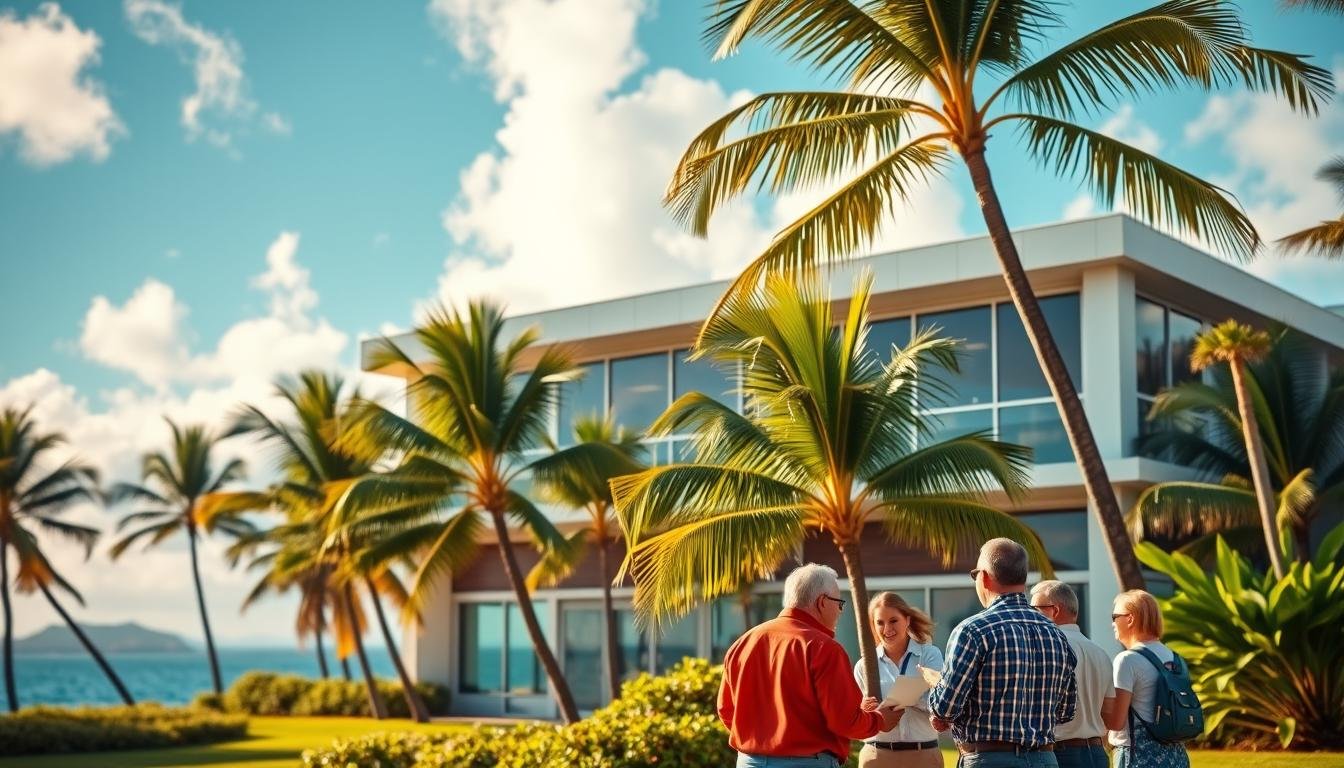Did you know that a single lawsuit or natural disaster can wipe out a small company’s assets and future earnings?
In Hawaii, small businesses face unique risks. Volcanic eruptions, hurricanes, and other natural disasters can damage property or interrupt operations. They are also vulnerable to claims of personal injury or property damage, accusations of professional negligence, and on-the-job employee injuries.

To mitigate these risks, having the right commercial insurance is critical. It provides financial protection against unexpected events. This ensures your company can continue to operate and recover from unforeseen circumstances.
Key Takeaways
- Small businesses in Hawaii are exposed to various risks that can impact their financial stability.
- Commercial insurance can protect against claims of personal injury, property damage, and professional negligence.
- Having the right insurance coverage is essential for business continuity and recovery.
- Natural disasters unique to Hawaii, such as volcanic eruptions, pose significant risks to businesses.
- Employee injuries on the job can be financially devastating without proper insurance.
The Business Insurance Landscape in Hawaii
Hawaii’s unique location poses significant challenges for businesses, making insurance coverage essential. The state is vulnerable to natural disasters like hurricanes, volcanic eruptions, and tsunamis. These events can have a major economic impact, affecting businesses and the state’s economy as a whole.
Unique Risks for Hawaii Businesses
Businesses in Hawaii face unique risks due to their location. Natural disasters are a major concern, with hurricanes and volcanic eruptions causing widespread damage. For example, the 2018 Kilauea eruption devastated local businesses, underscoring the need for strong insurance.
The state’s isolation also complicates supply chains and recovery efforts after disasters.
The Economic Impact of Proper Insurance Coverage
Proper insurance coverage can greatly reduce the economic impact of disasters on Hawaii businesses. With the right policies, businesses can quickly recover financially. A study by the Hawaii Department of Business, Economic Development, and Tourism showed that insured businesses fare better during natural disasters.
The table below highlights the economic benefits of insurance for Hawaii businesses.
| Economic Benefits | With Insurance | Without Insurance |
| Average Recovery Time | 6 months | 2 years |
| Business Survival Rate | 80% | 40% |
| Economic Loss | $1 million | $5 million |
Legal Requirements for Business Insurance in Hawaii
Understanding the legal requirements for business insurance in Hawaii is critical for companies operating in the state. Hawaii state law mandates that most businesses with employees carry certain types of insurance. This is to protect both the employer and the employees.
Mandatory Coverage by State Law
Hawaii law requires businesses with employees to carry workers’ compensation insurance. This insurance provides financial assistance to employees who suffer work-related injuries or illnesses. It covers medical expenses and lost wages. It’s essential for businesses to comply with this requirement to avoid legal penalties.
Also, Hawaii businesses may need to consider other mandatory coverage, such as unemployment insurance. This is required by state law to provide financial support to employees who lose their jobs through no fault of their own.
Industry-Specific Insurance Regulations
Different industries in Hawaii may have specific insurance requirements. For example, businesses in the construction industry may need to carry additional liability insurance. This is to cover the risks associated with construction projects. Businesses in the healthcare industry may require professional liability insurance to protect against malpractice claims.
It’s essential for Hawaii businesses to consult with a reputable hawaii insurance agency. They can determine the specific insurance requirements for their industry. By doing so, businesses can ensure compliance with state regulations and protect themselves against risks.
Types of Hawaii Business Insurance Coverage
Hawaii businesses face numerous risks, and insurance coverage is essential for protection. The right insurance can be the difference between recovery and ruin when faced with unexpected challenges.
General Liability Insurance
General liability insurance is vital for Hawaii businesses. It covers damages or injuries to third parties. This includes customer accidents on business premises or damage caused by business operations. For instance, if a customer slips and falls in a store, general liability insurance can cover medical expenses and legal fees.
“General liability insurance is a fundamental protection for businesses, shielding them from common risks,” says an insurance expert.
Professional Liability Insurance
Professional liability insurance, also known as errors and omissions insurance, protects businesses that provide professional services or advice. It covers claims of negligence, misrepresentation, or errors in professional services. For example, a Hawaii-based consulting firm could be protected if a client alleges that the firm’s advice led to financial loss.
Commercial Property Insurance
Commercial property insurance is vital for businesses that own or lease physical assets. It covers damage or loss to business property due to events like fire, theft, or natural disasters. Hawaii businesses, including those in the tourism sector, can benefit from this coverage due to the state’s susceptibility to hurricanes and volcanic eruptions.
Workers’ Compensation Insurance
Workers’ compensation insurance is mandatory for most Hawaii businesses with employees. It provides benefits to workers who are injured on the job, covering medical expenses and lost wages. This insurance is critical for maintaining a stable workforce and complying with state regulations.
In conclusion, Hawaii businesses can mitigate various risks by selecting the appropriate types of insurance coverage. Whether it’s general liability, professional liability, commercial property, or workers’ compensation insurance, each type plays a critical role in safeguarding a business’s future.
Top Hawaii Business Insurance Providers
In Hawaii, businesses have access to a variety of top-rated insurance providers. The market is diverse, featuring both local and national insurers. Each offers a range of coverage options tailored to meet different business needs.

HEMIC (Hawaii Employers’ Mutual Insurance Company)
Overview
HEMIC is a leading insurance provider in Hawaii, focusing on workers’ compensation insurance. Known for exceptional customer service and a deep understanding of the local business environment, HEMIC is a trusted partner for many.
Pros
- Expertise in workers’ compensation insurance
- Strong customer service
- Deep understanding of Hawaii’s business landscape
Cons
- Limited range of insurance products compared to some national providers
- May not be the best fit for businesses looking for a broad range of insurance coverage
Features
HEMIC provides a range of features, including risk management services and claims handling. Their workers’ compensation insurance is tailored to meet Hawaii businesses’ specific needs.
Recommendations
HEMIC is ideal for businesses needing specialized workers’ compensation insurance. Companies should choose HEMIC for its customer service and local expertise.
First Insurance Company of Hawaii
Overview
First Insurance Company of Hawaii is a prominent name in the state, providing a variety of insurance products. These include property, casualty, and workers’ compensation insurance.
Pros
- Diverse range of insurance products
- Strong financial stability
- Experienced in handling complex insurance needs
Cons
- May be more expensive than some other providers
- Complex policy options can be challenging to navigate
Features
First Insurance Company of Hawaii offers customizable insurance policies and dedicated customer support. Their wide range of insurance products makes them a one-stop-shop for many Hawaii businesses.
Recommendations
Businesses seeking a broad range of insurance coverage should consider First Insurance Company of Hawaii. They are well-suited for companies with complex insurance needs.
Island Insurance
Overview
Island Insurance is a well-established provider in Hawaii, covering property, casualty, and surety bonds. They are known for their personalized service and local expertise.
Pros
- Personalized customer service
- Local knowledge and expertise
- Flexible insurance options
Cons
- May not have the same level of financial resources as larger national providers
- Limited range of specialized insurance products
Features
Island Insurance offers tailored insurance solutions and responsive claims handling. Their commitment to customer service is a key feature of their business.
Recommendations
Island Insurance is a good fit for businesses seeking personalized service and local knowledge. Companies should consider Island Insurance if they value a more personalized approach to their insurance needs.
National Providers Serving Hawaii
Overview
Several national insurance providers serve the Hawaii market, providing a range of insurance products. These providers bring significant resources and expertise to the table.
Pros
- Broad range of insurance products
- Significant financial resources
- Advanced risk management and insurance solutions
Cons
- May lack the local touch of Hawaii-based insurers
- Can be less flexible in their policy offerings
Features
National providers offer comprehensive insurance packages and advanced risk management tools. Their scale allows them to offer competitive pricing and a wide range of coverage options.
Recommendations
Businesses with complex or widespread insurance needs may find national providers to be a good fit. Companies should consider national providers if they are looking for a broad range of insurance products and advanced risk management capabilities.
Cost Analysis of Hawaii Business Insurance
Hawaii business insurance costs are shaped by various factors, including location and claims history. It’s vital for businesses to grasp these elements to manage their insurance expenses effectively.
Average Premium Costs by Industry
Insurance premiums in Hawaii differ significantly across industries. For example, construction businesses often face higher premiums due to the inherent risks in construction. They might pay between $800 to $2,000 annually for general liability insurance. In contrast, professional services typically pay lower premiums, ranging from $400 to $1,200 per year, based on the services provided.
- Construction: $800 – $2,000 per year
- Professional Services: $400 – $1,200 per year
- Retail: $500 – $1,500 per year
Factors Affecting Insurance Rates
Several factors impact insurance rates in Hawaii, including business size, location, industry, and claims history. Businesses in areas prone to natural disasters, like hurricanes or volcanic eruptions, may see higher premiums. A history of frequent claims also increases insurance costs.
Businesses must assess their risk factors to negotiate better insurance rates.
Some key factors include:
- Business size and revenue
- Industry and risk level
- Location and natural disaster risk
- Claims history
Cost Comparison Between Providers
Different insurance providers in Hawaii offer varying premium rates for similar coverage. It’s critical for businesses to compare quotes from multiple insurers to find the best value. For instance, HEMIC (Hawaii Employers’ Mutual Insurance Company) and First Insurance Company of Hawaii are notable providers, providing competitive rates and extensive coverage options.
By comparing quotes and understanding the factors that affect insurance rates, Hawaii businesses can make informed decisions. This helps protect their operations without overextending their budgets.
Specialized Insurance for Hawaii’s Key Industries
Hawaii’s diverse economy necessitates tailored insurance solutions for its key industries. Each sector, from tourism to agriculture, presents unique challenges and insurance needs. This highlights the importance of specialized coverage for success.
Tourism and Hospitality Insurance Solutions
The tourism sector is a cornerstone of Hawaii’s economy, yet it’s fraught with risks. Visitor injuries, property damage, and natural disaster-related interruptions are common. Specialized insurance for these businesses can address these risks, ensuring swift recovery from unexpected events. “The right insurance coverage is vital for tourism businesses to manage risks and keep operations running,” notes a Hawaii insurance expert.
Agriculture and Aquaculture Coverage Options
Hawaii’s agriculture and aquaculture sectors are critical for local food security and economy. These industries face challenges like crop damage, livestock disease, and equipment failure. Insurance tailored to these sectors can cover crop losses, livestock mortality, and equipment breakdown. This support aids farmers and aquaculture businesses in recovering from setbacks and sustaining their operations.

Construction and Development Insurance Packages
Hawaii’s construction industry is exposed to various risks, including project delays, accidents, and equipment damage. Specialized insurance packages for construction and development projects address these risks. They also include surety bonds to ensure project completion. This strategy helps construction and development companies manage risks, complete projects on time, and within budget.
Retail and Service Business Protection
Retail and service businesses in Hawaii encounter risks like customer injuries, property damage, and interruptions. Insurance tailored to these sectors can cover these risks. This support helps them maintain operations and safeguard their assets.
By grasping the unique risks of Hawaii’s key industries and securing appropriate insurance, businesses can safeguard their assets. They can also maintain operations and contribute to the state’s economic stability.
How to Select the Best Hawaii Business Insurance
Choosing the right business insurance in Hawaii starts with understanding your company’s unique needs and risks. It’s about taking a detailed approach to find the perfect coverage for your business.
Conducting a Business Risk Assessment
Identifying your business’s risks is critical. You need to assess your assets, operations, and liabilities. This helps determine the insurance you should have. For example, tourism, agriculture, or construction businesses in Hawaii face different risks.
Working with Local vs. National Agents
Choosing between local or national insurance agents is a key decision for Hawaii businesses. Local agents know the local risks and regulations well. National agents, on the other hand, offer more resources and broader coverage. Here’s a comparison:
| Criteria | Local Agents | National Agents |
| Knowledge of Local Risks | High | Variable |
| Resource Availability | Limited | Extensive |
| Coverage Options | Specialized | Broad |
Evaluating Coverage vs. Cost
When looking at insurance options, balance is key. You must weigh the need for full coverage against the cost of premiums. Consider the risks and financial impacts of various coverage levels to find the best balance.
By carefully weighing these factors, Hawaii businesses can pick the best insurance. This ensures their assets are protected and their future is secure.
Strategies to Reduce Business Insurance Costs in Hawaii
Hawaii businesses can cut their insurance costs by adopting strategic measures. One key strategy is to explore different insurance options and customize coverage to fit their unique needs.
Policy Bundling Opportunities
Combining multiple insurance policies with one provider can result in substantial savings. For example, bundling general liability and commercial property insurance can lower premiums. Businesses should seek hawaii insurance quotes for bundled policies to gauge the savings.
Implementing Risk Management Programs
Effective risk management can decrease claim likelihood, which in turn reduces insurance costs. Implementing safety measures, employee training, and regular equipment upkeep are effective strategies. These actions not only mitigate risks but can also lead to lower business liability insurance hawaii premiums.

Industry Association Discounts and Programs
Many industry associations offer exclusive insurance discounts to their members. Hawaii businesses should explore these opportunities to save on insurance coverage in hawaii. For instance, tourism sector businesses might find specialized insurance packages through hospitality industry associations.
Annual Policy Review Best Practices
Regularly reviewing insurance policies ensures coverage remains relevant to business needs. This can also help identify savings opportunities. Annual reviews can uncover chances to adjust policies, potentially lowering premiums and improving coverage.
| Strategy | Potential Savings | Implementation Effort |
| Policy Bundling | Up to 20% | Low |
| Risk Management | Up to 15% | Medium |
| Industry Discounts | Up to 10% | Low |
| Annual Review | Variable | Low |
Conclusion
The significance of Hawaii business insurance is immense for companies in the state. It shields businesses from numerous risks, ensuring their continued existence and stability. By grasping the various insurance types, such as general liability and workers’ compensation, Hawaii businesses can make informed choices. This is vital for safeguarding their operations.
For small businesses, the right insurance coverage is critical. It’s essential to collaborate with trusted providers to discover the most suitable small business insurance Hawaii policies. In conclusion, investing in the correct insurance is a fundamental step in protecting your business.
Sources
For more information on business insurance in Hawaii, the following resources provide valuable insights and data.
- Hawaii Department of Commerce and Consumer Affairs: Insurance Division
- HEMIC (Hawaii Employers’ Mutual Insurance Company)
- First Insurance Company of Hawaii
- Island Insurance
These sources offer a wealth of information on Hawaii business insurance. They cover industry-specific insurance regulations, average premium costs, and top insurance providers in the state.
FAQ
What types of business insurance are mandatory in Hawaii?
In Hawaii, businesses with employees must have workers’ compensation insurance. This policy covers injuries and illnesses that happen on the job.
How do I choose the best business insurance provider in Hawaii?
To find the top business insurance provider in Hawaii, look at their reputation, financial health, and coverage options. Also, consider their customer service. Comparing quotes from different providers can help you find the best rates.
What are the unique risks that Hawaii businesses face, and how can insurance mitigate them?
Hawaii businesses deal with risks like hurricanes, volcanic eruptions, and tropical storms. Insurance, like commercial property and business interruption policies, can protect against property damage and income loss.
Can I bundle different insurance policies to reduce costs?
Yes, combining policies like general liability and commercial property insurance can cut costs. Many providers in Hawaii offer discounts for bundling, leading to lower premiums.
How can I reduce my business insurance costs in Hawaii?
To lower your business insurance costs in Hawaii, implement risk management strategies and take advantage of industry discounts. Review your policies annually to avoid over-insuring. A local insurance agent can help you find the best coverage at competitive rates.
What is the average cost of business insurance in Hawaii?
The cost of business insurance in Hawaii varies by industry, business size, and coverage. Due to unique risks like hurricanes and volcanic eruptions, premiums are often higher here.
Are there any industry-specific insurance regulations in Hawaii?
Yes, certain industries in Hawaii, like construction and healthcare, have specific insurance rules. For example, construction needs contractors’ liability insurance, while healthcare requires medical malpractice insurance.
Can I work with a national insurance agent to purchase business insurance in Hawaii?
Yes, you can work with a national insurance agent for business insurance in Hawaii. But, make sure they understand Hawaii’s unique risks and regulations. Local agents often have better knowledge of the state’s insurance needs.
What is the importance of conducting a business risk assessment for insurance purposes?
Doing a business risk assessment is key for identifying risks and figuring out needed insurance. It helps businesses understand their risk exposure and make informed insurance decisions.
